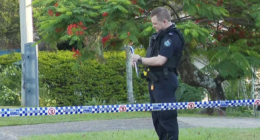Share this @internewscast.com
In just over a month, families and friends will gather to enjoy their Christmas meals, a time of festive cheer. However, for some, this season also highlights a well-known investment strategy: investing in food and beverage companies as a defensive measure.
Despite economic challenges, people still need to eat, and perhaps indulge in a drink or two to keep the spirits high.
Recent developments have made this investment approach even more appealing. Sir Dave Lewis, credited with steering Tesco away from a crisis a decade ago, has been appointed as the new leader of Diageo. This £40 billion giant, known for products like Guinness and Johnnie Walker, has been facing troubles. The financial world is optimistic that ‘Drastic Dave,’ as he is famously called, can work his magic in time for future holiday seasons.
This could be uplifting news for Diageo’s uneasy shareholders. However, the upcoming Budget in 11 days poses a potential challenge, with rumors suggesting that Chancellor Rachel Reeves might again increase taxes on alcohol.
The anticipation surrounding Reeves’ announcement has already led to a slowdown in supermarket sales in the past few weeks.
Last year’s Budget, which included hikes in employer National Insurance and other taxes, already hit supermarkets hard. They are hoping for a ‘pro-jobs, pro-growth’ statement this time, one that will benefit the retail sector. Whether the Chancellor will heed this call remains uncertain until the announcement on November 26, keeping speculation alive.

Serving up a feast: When times are tough, people still need to eat – but maybe also have the odd drink and be merry
But if you are looking for short or long-term diversification, the £76billion UK wine and spirits sector is an inviting prospect – particularly if you are re-positioning your portfolio to gain more exposure to British stocks. The FTSE 100 reached a record 9,808 this week before falling yesterday amid Budget jitters.
Yes, apprehension may surround the impact of the Budget, but there still are reasons to be cheerful about UK plc.
Food and drink might be seen as a safe haven, but hazards lurk. Sales at private equity-owned Asda dropped by 6 per cent over the past quarter, indicating that discounts alone are no longer sufficient to entice even the cash-strapped.
Alexandra Jackson, manager of the Rathbones UK Opportunities fund, says: ‘This is a sector defined by its razor-thin margins, operational complexity, intense competition and volatile consumer trends.’
The latest include the ‘sober curious’ movement among members of Gen Z, the target clientele for Diageo’s Casamigos and other tequilas.
But supermarkets are the beneficiaries of another consumer behaviour shift, dubbed ‘staying-in is the new going out’.
In response to the expense of restaurant food, households are opting for supermarkets’ premium ready meals. Diageo should be able to supply the accompanying wines.
Figures from analytics group NIQ highlight the appetite for premium private label dining.
Sales of Marks & Spencer’s ranges are not only bounding ahead in its own stores, but also through its venture with Ocado.
To the chagrin of investors, including myself, M&S shares are down this year owing to the cyber attack that paralysed its operations in the spring.
Yet analysts rate its shares, which stand at 353.7p, a ‘buy’ based on the view that the British will want to spoil themselves this Christmas – and beyond.
TESCO
Britain’s number one grocer controls 28.3 per cent of the market.
The aim is to achieve a 30 per cent share by offering more value to customers who might otherwise abscond to the German discounters Aldi and Lidl, and by appealing to the more affluent through its Finest premium label range.
Tesco’s buoyant state contrasts markedly with its predicament in 2014 at the height of the accounting crisis that had engulfed the company. Luckily, Lewis arrived to save the day.
Ken Murphy, Lewis’s successor, is also seen as a class act. Jackson says that Murphy’s adroit capital allocation decisions, which reflect ‘a deep understanding of what drives long-term performance’, are the reason why Tesco is the cornerstone of her fund. At 438.4p, Tesco shares are 18.5 per cent higher than at the start of the year, although they are still below the 606p peak in 2007.
No analyst forecasts a return to such heights, but they do rate the shares, which offer a 3 per cent dividend yield, a ‘buy’.
I took a tiny stake in Tesco in February 2024, when the shares were 285p.
I was following my own advice in this column, partly spurred by purchases of pieces of Tesco F&F clothing items that people assumed were designer.
I am not selling.

SAINSBURY’S
Sainsbury’s, which holds second place in the UK supermarket league with 15.3pc share, has long been in Tesco’s shadow. But analysts sense that Sainsbury’s may be stepping more into the limelight following a better-than-expected first-half performance.
Sainsbury’s is benefiting from its Nectar loyalty scheme and from staying in is the new going out.
Chief executive Simon Roberts says that more customers are sampling its Taste The Difference range.
The disposal of its banking operation to NatWest has also boosted the company, and the next sell-off could be Argos, which owns homeware business Habitat.
However, Argos is likely to fetch rather less than the £1.1billion Sainsbury’s paid for it in 2016.
Most analysts consider Sainsbury’s a ‘hold’ at 322p. The shares could maintain their upward momentum if it enjoys a bumper festive season. Income seekers will like the 6 per cent dividend yield.
DIAGEO
Shares in Diageo leapt by 8 per cent this week on news of Lewis’s appointment. The heavily indebted group’s many problems include not only Gen Z teetotalism, but a move among all generations to ‘low-or-no’ alcohol.
Non-alcoholic Guinness Zero is proving to be a favourite among all age groups.
Yet selling Guinness is one option open to Lewis if he agrees with an analysis from the Swiss bank UBS that Diageo could be worth 40 per cent more if broken up.
As an investor, I am hoping that Lewis will deploy all his expertise, especially since Diageo’s shares have fallen by 20 per cent since last Christmas to 1793.5p.
Among the 20 brokers that follow the stock, six consider Diageo a ‘buy’. The rest contend that the shares are worth holding.
The bounce in Diageo shares following Lewis’s appointment suggests the audacious are taking a flutter on such an outcome, which would certainly be an excuse for a toast in Casamigos, Guinness Zero or Smirnoff. With maybe some M&S, Sainsbury’s or Tesco canapes, too.
DIY INVESTING PLATFORMS
AJ Bell

AJ Bell
Easy investing and ready-made portfolios
Hargreaves Lansdown

Hargreaves Lansdown
Free fund dealing and investment ideas
interactive investor

interactive investor
Flat-fee investing from £4.99 per month
Freetrade

Freetrade
Investing Isa now free on basic plan
Trading 212
Trading 212
Free share dealing and no account fee
Affiliate links: If you take out a product This is Money may earn a commission. These deals are chosen by our editorial team, as we think they are worth highlighting. This does not affect our editorial independence.
Compare the best investing account for you










